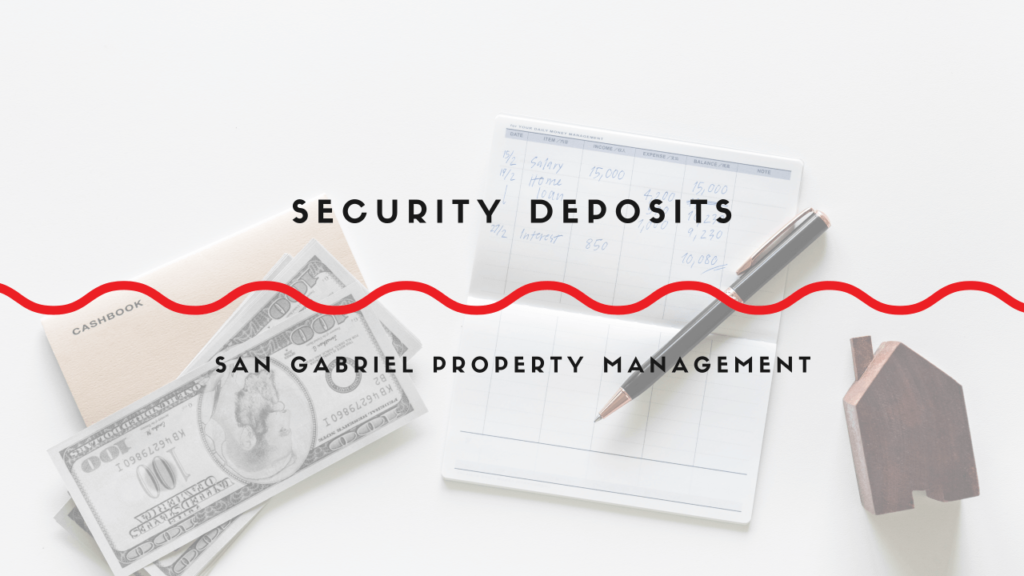
California has strict laws about how security deposits are collected, held, and returned. When you own San Gabriel rental property, you need to understand the timelines and the requirements of security deposits. Tenants will dispute any deductions that they believe are unfair, and if you lose a court case, you could find yourself paying three times the amount of the deposit in penalties.
We have some tips for you today on how to handle security deposits.
Collecting a Security Deposit
There are limits to the amount of money you can collect in a security deposit. Assuming your property is unfurnished, you can collect the equivalent of two times the monthly rent. So, if your rent is $2,500 per month, your security deposit cannot exceed $5,000. When you rent out a furnished property, you can collect up to three times the amount of rent.
Be sure to get the full security deposit from your tenant when you sign the lease. We recommend you get it in certified funds.
Holding a Security Deposit
It’s important to understand that you cannot spend the tenant’s security deposit during the tenancy. This is still the tenant’s money, and you are holding it to protect yourself against the risk of property damage or nonpayment of rent. Keep it separate from your own funds, and make sure you don’t touch it until it’s time to return it to the tenant or use it to pay for repairs.
Offer a Pre Move-Out Inspection
In California, you must offer your tenants a pre move-out inspection of the rental property before the end of their lease term. We don’t often have tenants who want to do this, but you still need to offer it.
It’s actually an excellent opportunity to walk through the property with your tenant and point out things that might result in a charge against their security deposit. It lets you know what you’ll have to be prepared to repair before you rent the home out to a new tenant, and it lets your current tenant know that they either have to take care of these things themselves or prepare to lose money from their deposit to pay for them.
Conduct a Full Inspection after Move-Out
After your tenants have turned in the keys and left a forwarding address, you’ll need to go through the vacant property and document its condition. Bring your move-in inspection report with you so you can compare the condition of the home at this point to the condition it was in when the tenants took possession. Hopefully you created a well-documented record of how everything looked then.
Remember that you’re not permitted to deduct anything from the security deposit for regular wear and tear. Those small nail holes in the walls and scuff marks from where the sofa rested cannot be charged to the tenant. Landlords are responsible for wear and tear items.
However, if your lease states that the property must be professionally cleaned before the tenants move out and it clearly has not been cleaned, you can charge for that. Make sure you take pictures to document that it was not cleaned. If you notice damages that are beyond normal wear and tear, you can charge for that. Make sure you can demonstrate that those things were not broken or damaged at the beginning of the lease.
You can also charge the security deposit for any unpaid rent, so if you’re going to do that, make sure you have the accounting repots and rent statements to prove that money is owed.
Security Deposit Timelines
California law requires you to return the security deposit to the tenants within 21 days of the tenant moving out. If the tenant isn’t receiving a full deposit refund, you should send the amount that they are getting back with an itemized list of what you’ve deducted and why. Be specific and include receipts, invoices, and other documentation to support what you’ve charged.
If your tenant disputes what you’ve withheld or you don’t return the deposit in time, you could face penalties of three times the amount of the original security deposit. It’s important that you know what’s expected of you, and that you follow the law.
 We can help you lawfully collect, hold, and return a security deposit with your San Gabriel rental property. Contact us at ZenPro Property Management.
We can help you lawfully collect, hold, and return a security deposit with your San Gabriel rental property. Contact us at ZenPro Property Management.
